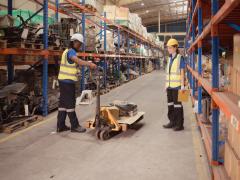Mamiki Matlawa, Group Business Development Executive at ACTOM, believes that South Africa has the industrial capability. What we need is the will to use it. She shares her insights in this article.

Public procurement decisions often lean towards short-term pricing, but that approach carries long-term consequences. When cost becomes the dominant factor, essential priorities — like lifecycle support, technical reliability, and sustainability — are overlooked. Transnet is just one example of how quickly things can unravel when systems aren’t aligned with local conditions and supported by teams on the ground.
However, South Africa has an opportunity to shift this approach — to build with intention, invest in resilience, and strengthen local industry in the long haul.
Local manufacturing builds more than products
Every time we manufacture equipment locally, we create more than a physical asset. We create jobs. We build supply chains. We accelerate skills development and reinvest in South African communities. The local manufacturing sector is central to national development and should be treated as a strategic enabler.
Apprenticeships and engineer-in-training programmes, for example, are designed to support both local business operations and the broader industry by making more qualified people available – thereby also serving the economy at large. Long-term commitments like these boost internal efficiency, as teams stay close to the systems they build, understand their environments, and respond with the urgency and insight that only proximity provides.
The real cost emerges over time
The initial price is one figure on a spreadsheet. But what matters more is whether the system will perform consistently over its lifetime — and who will support it when something goes wrong. Without local technical expertise and a strong after-sales network, even well-designed systems become vulnerable.
When disruptions occur, the costs escalate quickly. Delays, downtime, and lack of support impact entire communities and critical infrastructure. This is especially true in the energy sector, where reliability isn’t a bonus — it’s essential.
Partnership in practice
Government departments, utilities, and municipalities carry the weight of immense responsibility. Budgets are tight, expectations are high, and every decision carries risk. But working with local partners can ease that burden. The private sector is already contributing to national objectives like job creation, capacity building, and energy resilience — and we are ready to do more.
We are here, trained, equipped, and committed.
South Africa doesn’t need to look far to find industrial strength. We already have it — right here at home.














